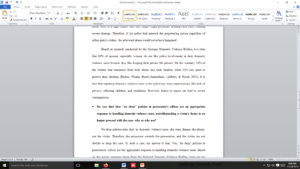Psychology of Trauma
Interview someone who was traumatized through intimate partner violence (domestic violence). In your 2-page report discuss their coping techniques or what methods were used in their recovery or if they didn’t recover, where they are at right now and discuss why they are struggling to recover. Mention what treatment options you would consider as a therapist, to aid their recovery.
APA format with references and citing
Answer preview
One approach that helped my interviewee, Mary, used to recover from the psychological trauma was social support. Mary got social support from a community group where other victims in her neighborhood convene. The founder of the group, who was also a victim, started the initiative to help other women who needed a place they could vent their traumatic experiences. Through sharing, Mary felt she was not alone, which gave her the courage to face her fears. Also, with the support she got from her family members, this made it easy for Mary to be open-minded when communicating and expressing her feelings when happy or sad. Although she disclosed having self-deception, which is a harmful coping method, the advice she got about accepting what had happened helped Mary. In the process, my interviewee discovered the importance of engaging in activities that kept her occupied, such as jogging, volunteering in community activities, and watching comic movies that kept her happy. These activities were quite resourceful because Mary got to work on her physical fitness and learned the importance of being around people who helped her have emotional stability.
[683 Words]

Psychology of Trauma


